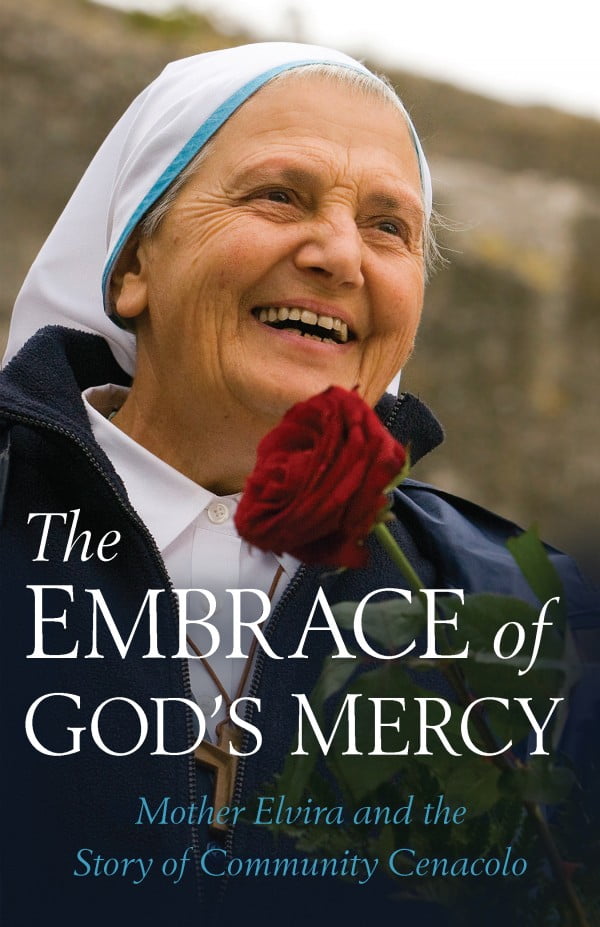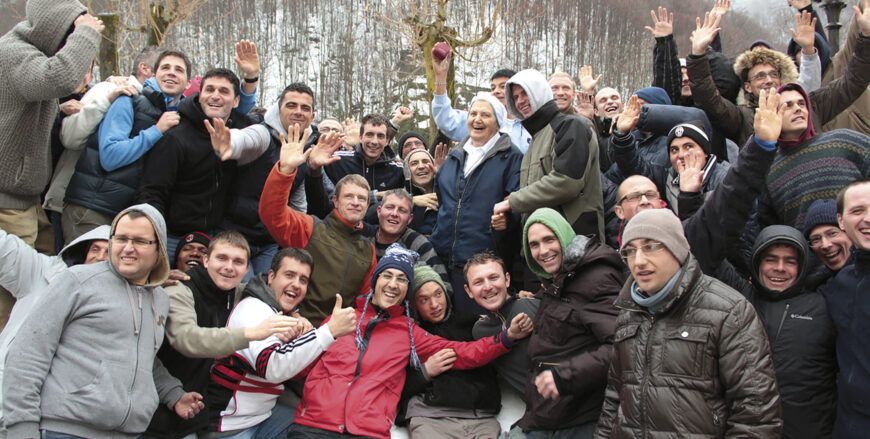“Today’s drug addict tells us that all of society is poisoned…. Drug addicts, who suffer with darkness, sadness, anxiety, and the death of their heart, are the prophets of our times. They scream out to us with their lives and wrong choices, ‘We’ve had everything, but we failed!’ They are expressing to us the only truth of the human heart: we all need God!”
–Mother Elvira Petrozzi (1937-2023)
What is Comunità Cenacolo?
Comunita Cenacolo, or the Community of the Cenacle, is a community for young people founded in Italy in 1983 by a dynamic, vibrant and faith-filled religious sister named Elvira Petrozzi. It consists of consecrated religious priests, brothers, sisters; married couples; single men and women; and children.
The Community was formed with the intention of reaching out to disillusioned young people, especially those who live in the darkness of drugs, alcohol and other addictions, unable to grasp any meaning in their lives. It offers them a chance to live out the Christian life in its simplicity through a disciplined, family style of life based on prayer and work, true friendship, sacrifice, and faith in Jesus – something that many of them have not experienced before living at Cenacolo. Mother Elvira believed that this simple way of life is the answer to the restlessness in the human heart that these youth experience as a result of modern life.
Unlike rehabilitation centers, Comunita Cenacolo is not a program; instead, it is a “School of Life.” Mother Elvira began the community based on her conviction that we only become fulfilled as believers and as Christians through serving one another: “Do a little act of charity or a kindness for somebody else; you will discover that, in addition to the sin that wounded you, you carry inside a treasure of goodness that should be given to others.”
The Catholic faith is the basis of life in Cenacolo, and the spirituality of the Community is Eucharistic and Marian. The day is structured around times of prayer, work, deep sharing about one’s own life, recreation, and celebration. While living at Cenacolo, the youth experience God’s mercy, and are therefore freed from the addictions and other behaviors that had previously kept them bound in loneliness, depression, despair, anger, and fear.
Mother Elvira’s Childhood: The First “School of Life”
Elvira Petrozzi, the foundress of Comunita Cenacolo, was born into a poor family living in Sora of Alessandria, Italy, during the time of World War II. She described her family life as a life “made of many sacrifices.” Due to her father’s alcoholism, her mother, a nurse, had to work outside the house for long hours each day to support the family, and they did not have very much materially. Despite these hardships, she recalls that her mother often made Elvira and her siblings feel “full of serenity and trust.”
Her childhood filled with sacrifices taught Elvira many of her Christian values, including how to view life’s challenges in a constructive, meaningful way, and how to perceive life as a blessing no matter what may be happening. For instance, during the war, her family did not always have enough to eat. Through such circumstances, she learned that “the value of life… is always more than every problem. This life has taught me since I was little to think of others always before me, and today I recognize that this has been my richness and my first formation as a human and a Christian.”
In addition to material poverty, she had many experiences that taught her how to love other people, in spite of their sins:
“My father would get drunk every so often and this would cause judgments, shame, humiliation and difficulty that all seemed useless sufferings. But now I understand that God has also guided my life through the fragility of my father. In spite of everything, my teacher of life has taught me what it means to sacrifice. He made me understand what humiliation was. Today I feel that I am truly a free woman, aware that in us there is a continual resource of the love of God that permits us to rise to every situation. I am not ashamed to say that the fragility of my father was my first university…my ‘School of Life’… to learn to stretch out my hand to him and others fragile like him.”
It is this view of others, and of suffering, that she aspired to teach the youth at Cenacolo: “We must develop our capacity to suffer and simultaneously, to offer up this pain. To do this, it is necessary to tell God, to cry out to God, about our suffering, kneeling with our eyes fixed on the crucifix. We must develop this mentality, this way of confronting life, so that when we encounter the cross, we do not trivialize, diminish, or strip away the value of this precious moment in which Jesus allows us to share the pain of His Cross, by giving us a splinter.”
A Calling From God
When she was nineteen years old, Elvira left her family to join the convent of the Sisters of Charity of St. Giovanna Antida Thouret, at Borgaro Torinese. She remained in this community for twenty-eight years, during which she began to feel a strong desire to work to help young people, especially those who were lost and searching for “something more.”
Her difficult childhood experiences with poverty and with her father’s addiction had made her realize that material wealth and comfort is not the source of true joy, peace, and sense of purpose in life. She also noticed that although many others did have enough materially, they were empty spiritually and emotionally:
“I realized that there was an abundance of abandoned and outcast youth in this consumer society. I was aware that in the family there was no dialogue or communication, and that there was a lack of trust between spouses, parents, and children. The youth were left alone and I saw them sad in the streets. Within my prayer I began to perceive their cries and their sorrow. I felt in me a push that I was not able to suppress, that always grew deeper, more intense.”
During her years with the Sisters of Charity, she asked God many times over several years to be able to open up a house for such youth, where they could live in community and for each other.
Cenacolo’s Beginnings
Even though Sister Elvira was aware of her personal limitations, she expressed her desire to her superiors. However, they felt that she was unprepared for such a mission, and told her that the time was not right: “There was a painful waiting period, but the tenacity and the patience that God gave me was a sign of His paternity to that which was being born. The waiting was not as difficult, and although I suffered because it seemed like I was losing time, I waited with much trust and hope…. My superiors had reason for telling me I was not prepared and not allowing me to go and live in the middle of these troubled youth. There was never a time without the temptation of these thoughts. ‘Why is this? Why don’t they have trust in me?’ And then I said to myself: ‘Why should they have trust in me, a poor creature? Now I realize all this waiting was really a blessing. It was a labor pain of birth.”
It wasn’t until July 16, 1983, the Feast of Our Lady of Mt. Carmel, that she was given an old, abandoned house at Saluzzo, Italy, and told she could begin creating a community for youth. She describes the moment when she first arrived: “Seeing the house in that miserable state made me want to pull my hair out. Without doors, windows, a roof that needed replacement, no appliances, no beds and no money. It was in ruins. It looked often like it was lost but I saw already the house as it is today: beautifully constructed and full of youth…. For me it was a moment in which I rediscovered my faith. I found a ‘concrete’ and incarnated faith that wasn’t afraid to take risks. When I saw that open gate I took a deep breath. I was happy. I remember that I felt so good inside and my heart was moved. It was dancing. The time had come and inside of me I felt the fullness of life.”
Only days had passed when already boys began arriving, asking if the house was a home for drug addicts: “We hadn’t defined it as a ‘Community for drug addicts,’ but a Community for young people, lost in boredom, in their insecurities, unable to start and finish a story. We looked at each other and said, ‘drug addicts or not, they’re young.’” This was the beginning of the Comunita Cenacolo mission houses.
Read the whole story in the spring issues of Signs & Wonders for Our Times, coming out soon. Become a member today to get this issue!
Lorraine Ondrasik and her husband Paul are long-time supporters of Comunita Cenacolo. Their son greatly benefited from the spiritual intervention that this program offers.


